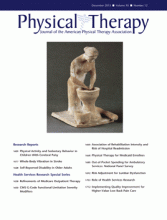Health services research (HSR) and health policy topics are critically important to the future of the physical therapy profession, but they are included only rarely in physical therapy journals—until now. We are pleased to introduce the first of a 3-part special series on physical therapy–relevant HSR and health policy in rehabilitation.
According to the Agency for Health Care Research and Quality, HSR is a “multidisciplinary field of scientific investigation that studies how social factors, financing systems, organizational structures and processes, health technologies, and personal behaviors affect access to health care, the quality and cost of health care, and ultimately, our health and well-being.”1 HSR provides data, evidence, and tools to help make health care affordable, safe, effective, equitable, accessible, and patient centered. Products derived from HSR inform health policy—defined as “decisions, plans, and actions that are undertaken to achieve specific health care goals within a society”2—at all levels, from individual providers (eg, physical therapists), to health care organizations and systems, to payers and government. At one end of the spectrum, HSR can enable providers and patients to make better decisions about their individual health care; at the other end, HSR can inform decisions about payment policy and health care coverage for populations.
Health services research has never been more important than it is now, as health systems struggle to control costs and provide high-quality, high-value care. Desperately needed to demonstrate both the necessity and the value of physical therapy, this domain of research will provide data to inform the organization and delivery of physical therapy care, payment policies related to physical therapy, and future state and federal health care regulations.
In physical therapy, HSR was first promoted within APTA's Health Policy Administration (HPA) Section and presented through HPA platform and poster presentations. In 2005, the section initiated …












